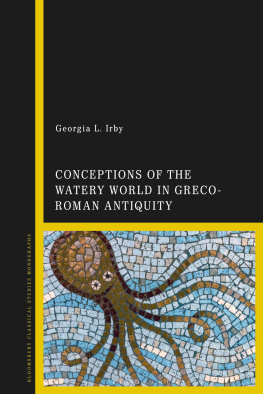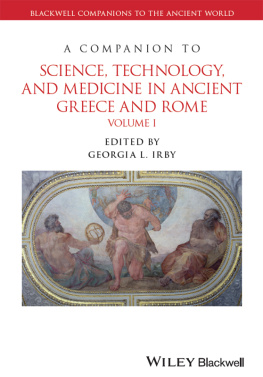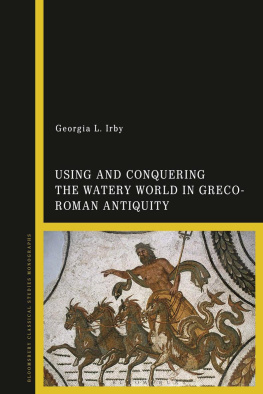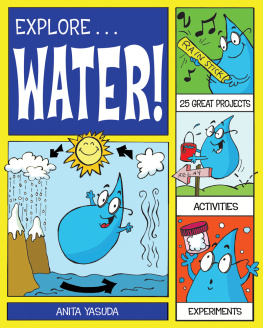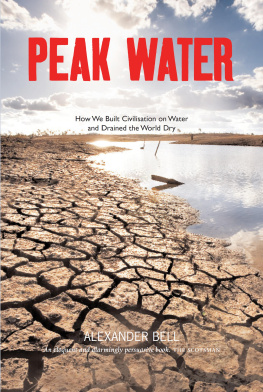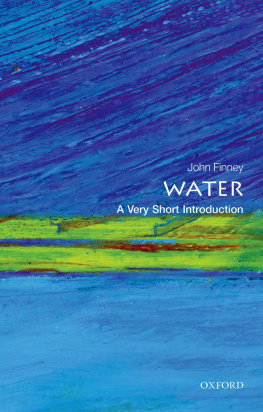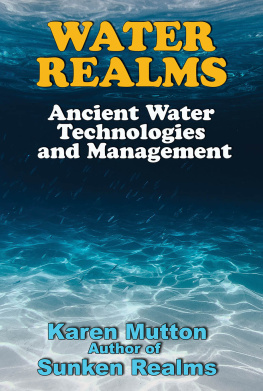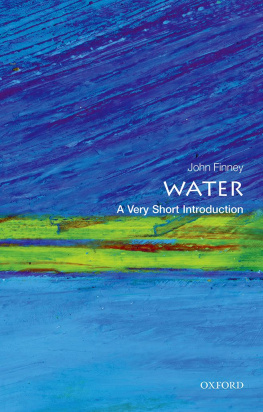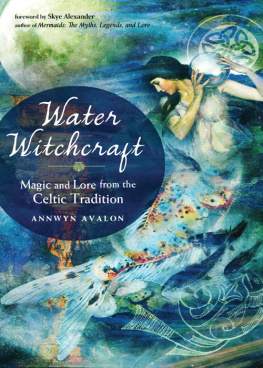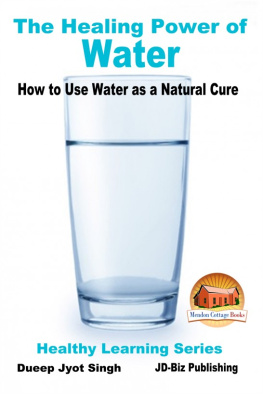
Conceptions of the Watery World
in Greco-Roman Antiquity
Also available from Bloomsbury
Mountain Dialogues from Antiquity to Modernity edited by Dawn Hollis and Jason Knig
The Ancient Mediterranean Sea in Modern Visual and Performing Arts edited by Rosario Rovira Guardiola
The Horse in the Ancient World: From Bucephalus to the Hippodrome by Carolyn Willekes

Contents
Maps
Figures
| AE | LAnne pigraphique |
| AJA | American Journal of Archaeology |
| AJP | American Journal of Philology |
| AWP | Hippocratic Airs, Waters, Places |
| BM | British Museum |
| CIL | Corpus Inscriptionum Latinarum (Berlin 1863) |
| CJ | Classical Journal |
| CMG | Corpus Medicorum Graecorum |
| CPh | Classical Philology |
| CQ | Classical Quarterly |
| DK | Hermann Diels and Walther Kranz (eds.), Die Fragmente der Vorsokratiker, griechisch und deutsch (Berlin, 195152) |
| FGrHist | F. Jacoby, Fragmente der griechischen Historiker (Leiden, 1923): https://referenceworks.brillonline.com/browse/die-fragmente-der-griechischen-historiker-i-iii |
| HH | Homeric Hymn |
| I.Ephesus | Die Inschriften von Ephesos (Bonn, 197984) |
| IC | M. Guarducci, Inscriptiones Creticae (Rome, 193550) |
| IG | Inscriptiones Graecae (Berlin, 18731939) |
| ILS | H. Dessau (ed.), Inscriptiones Latinae Selectae (Berlin, 18921916) |
| IosPE | Inscriptiones antiquae Orae Septentrionalis Ponti Euxini. Third edition online: http://iospe.kcl.ac.uk/index.html |
| JHS | Journal of Hellenic Studies |
| JRA | Journal of Roman Archaeology |
| JRS | Journal of Roman Studies |
| LIMC | Lexicon Iconographicum Mythologiae Classicae (Zurich, 1981) |
| LSCG | F. Sokolowski, Lois sacres des cits grecques (cole franaise dAthnes, Travaux et mmoires des anciens membres trangers de lcole et de divers savants 18) (Paris, 1969) |
| OGIS | Wilhelm Dittenberger (ed.), Orientis Graeci Inscriptiones Selectae (Hildesheim, 19035) |
| PECS | William L. MacDonald and Marian Holland McAllister (eds.), Princeton Encyclopedia of Classical Sites (Princeton, 1976) |
| RIB | R. G. Collingwood, R. P. Wright, R. S. O. Tomlin, et al. (eds.), The Roman Inscriptions of Britain (Oxford, 1965): https://romaninscriptionsofbritain.org/ |
| RIC | H. Mattingly, E. A. Sydenham, and others (eds.), Roman Imperial Coinage (London, 192367); revised edition of vol. 1: C. H. V. Sutherland and R. A. G. Carson (1984) |
| RPC | Burnett, Andrew, Michel Amandry, Chris Howgego, Jerome Mairat, Roman provincial Coinage (London, 1992): https://rpc.ashmus.ox.ac.uk/ |
| SEG | Supplementum Epigraphicum Graecum (Leiden 19232002) |
| SVF | Stoicorum Veterum Fragmenta (Leipzig, 190524; reprinted Stuttgart, 1968) |
| TEGP | Daniel W. Graham, The Texts of Early Greek Philosophy: The Complete Fragments and Selected Testimonies of the Major Presocratics. 2 vols. (Cambridge, 2010) |
| UCWW | Georgia L. Irby, Using and Conquering the Watery World in Greco-Roman Antiquity (London, 2021) |
No work of scholarship is produced in isolation, and this project has its genesis in a course that I have the privilege of teaching to first year students at William & Mary, Why Water Matters, where students learn about the fluidity of critical inquiry and the scholarly process as an interplay between primary sources, academic training, and the scholars own cultural and political biases. Together we investigate the critical question about human engagement with the natural world, our sources of information, the advantages and disadvantages of those sources (often fragmentary, poorly preserved, inadequately contextualized, and insufficiently curated), our understanding, perception, and interpretation of those sources, how social, cultural, and political factors influence our perception of the environment, and how our own attitudes to the natural world shape our culture, art, literature, and politics. This book is very much the product of that conversation. In particular, I thank those students in my Fall 2018 class. Enduring an uncivilized 8:00 a.m. curtain call, this talented and enthusiastic group read drafts of the chapters in various stages of polish, bringing slips to my attention, and making countless salient suggestions for improving transitions, adding material, and clarifying arguments. They have earned their mention here: Greg Arrigo, Elizabeth Ashley, Theo Biddle, Jonathan Broady, Marcus Crowell, Zack Daniel, Daniel Gittings, Caileigh Gulotta, Christian Gulotta, Zack Johnson, Cole Kim, Rebecca Klinger, Abhishek Mullapudi, Freddie Nunnelley, Charlie Perry, Clay Shafer, Ben Sharrer, Percy Skalski, Ann Grace Towler, and Tammy Yin. I should also like to recognize Emma Grenfell, Abby Maher, Jake Morrin, Lindsey Smith, and Georgia Thoms, students from my Fall 2019 class who vetted the penultimate version of this manuscript, and brought to my attention a number of lingering, pesky infelicities.
My gratitude extends also to Alex Wright (now at Cambridge University Press), whose gentle prodding guided this project from scattered lecture notes to book manuscript, and to Alice Wright and Georgina Leighton, my editors at Bloomsbury, who took up the gauntlet midstream, and their assistant Lily Mac Mahon. The manuscript has benefited immensely from the helpful observations and suggestions of the anonymous reviewers. Thanks are also owed to senior production editor Rachel Walker at Bloomsbury, Merv Honeywood, the project manager at Refinecatch, copyeditor Susan Dobson, and the page setters whose combined efforts behind the scenes facilitated the publishing process and added sparkle to the text. I am grateful to the Inter-Library Loan Staff at Swem Library at William & Mary, who sometimes even seem to anticipate the needs of their patrons, as well as the cheerful, knowledgeable, and efficient staff in Information Technology who keep my digital resources in good working order. Also meriting recognition is my research assistant, Keegan Sudkamp-Tostevin, who painstakingly double checked many of the primary references, caught slips both great and small, and helped bring my vision into greater focus. His deep curiosity and enthusiasm were inspirational as my energy levels waned. Individual chapters have benefited from the scrutiny of Robert Nichols and Jessica Stephens, my colleagues at William & Mary. Andrew Wards comments on Samothrace have been invaluable. The adroitly graceful comments of Molly Ayn Jones-Lewis, especially on the medical material, have resulted in many improvements, a more nuanced treatment, and a more coherent structure of the entire manuscript. Duane W. Roller read the entire manuscript in draft form. As always, his eagle-eye caught many infelicities, and his encyclopedic comments, leading to new avenues of inquiry, have improved the substance and spirit of the text. Finally, sincere thanks to the reader for thoughtful comments and astute suggestions that helped bring into focus the books overarching vision. Any errors that remain are my own.
Next page
